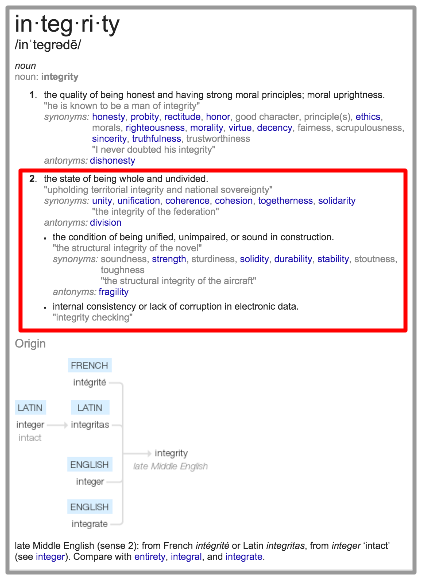
As I was brushing Laura's teeth last Saturday morning, which happened to be the morning of Halloween, I listened to her titter about how excited she was because, later that day, she was “gonna be Anna!!!” from Frozen. As we were talking about it, I wanted to remind her that it was her Grandpa and Grandma Stuart who had bought the costume for her.
“Laura, what are you going to say to Grandma Stuart when she comes?”
“Thank you for da Anna dress and da micophone, Gramma!”
“How about to Grandpa Stuart?”
“Thank you, Gampa!”
(Laura is three; see Figure 1.)
Laura knows that you're supposed to say thank you for kindnesses received, and yet the act of saying thank you isn't automatic for her yet — hence this rehearsal during teeth-brushing. As Laura's father, my desire is that gratitude be well-developed in her, both externally (in the habit of saying “thank you”) and internally (in the habit of focusing on all she has versus all she doesn't). I want these things for Laura not because I look like a good dad when she says “Thank you,” but because external gratitude will make her a blessing to others and internal gratitude is a great source of motivation. In short, I want Laura to live a flourishing life, and gratitude is one of the surest means toward that. [1]
But as I was talking Laura through this gratitude rehearsal, a sick feeling hit my stomach: I remembered a thank you letter that I had been needing to write for not weeks, but months. Here I was, teaching my kid a lesson I was currently failing.
The point of this article is that I like that about teaching.
I. The inevitability of hypocrisy

If you're going to teach character strengths well, you've got to have experiential knowledge about what you're talking about. This lends to your teacher credibility, which John Hattie's “Visible Learning” meta-analysis has found to be a significant factor in student outcomes (effect size .90, as found in Visible Learning for Teachers).
In other words,
- If you will not work to bring energy to your work and to encourage and invigorate others, then remove Zest from your wall (see Figure 2);
- If you aren't going to work to remove habits of complaining, critiquing, and bitterness from your own life, take Gratitude down;
- If you aren't willing to work toward a long-term, difficult goal that you're passionate about, don't teach Grit;
- If you refuse to try to engage with people who are different from you or to reduce your annoying behaviors (*points at self*), tear down Social Intelligence.
And here's what I like about this challenge: it's impossible to do it perfectly.
Inevitably, we all find ourselves being hypocrites, just like I did when teaching my three-year-old the virtue of gratitude. Unfortunately, the word hypocrite isn't typically one we would use to describe ourselves. I'm reminded of Carol Dweck's recent comments in an Ed Week article:
In many quarters, a growth mindset ha[s] become the right thing to have, the right way to think. It [i]s as though educators [a]re faced with a choice: Are you an enlightened person who fosters students’ well-being? Or are you an unenlightened person, with a fixed mindset, who undermines them? So, of course, many claimed the growth-mindset identity. But the path to a growth mindset is a journey, not a proclamation.
So, too, with hypocrisy. Are you an enlightened person? Are you a respectable teacher? Then surely you are not a hypocrite.
Get such wrong-headed thinking out of your mind. Just as growth mindset is a journey, so, too, is the consistent life, the life devoid of hypocrisy, the life where the character strengths we teach are the ones we master daily. Dweck said it: fixed mindset isn't simply something you decide you won't have; it's something you become better and better at detecting in yourself and working through. You massage it out, like a knot in the muscles of your psyche.
So, too, with all the areas where the character strengths we extol don't match our actions.

II. A pursuit of integrity
Integrity isn't one of the character strengths on my wall primarily because, today, its moral connotations cloud its original meaning (see Figure 3, which is the result of a Google search for “integrity etymology”). While I'm all for morality, I think the moral connotations here are unfortunate because they paint the word into an unnecessary corner.
When I say I want to live an integrated life — a life of integrity — it certainly means that I hope to be honest and morally upright, but even more than that it means that I want to iron out the seams in my life. I want there to be less of a jarring sensation when I see a student in the local grocery store while I'm with my wife and children, or when my friends from church see me interact with my relatives or my colleagues. In short, I want to be like an integer in math class, a “whole number”; I want to be consistent.
Or let me bring it to a place that every teacher can relate to: I want the conversations I have about students and colleagues and bosses to be the kinds of conversations I wouldn't be humiliated to have broadcasted for the world to see. I know my own tendency to speak in private like I never would in public — and that bothers me not just from the obvious moral standpoint, but also from the performance standpoint. And my goal with this paragraph is to produce introspection, not guilt.
What mental energies do I unconsciously spend keeping my stories straight and my multiple selves correctly hidden or displayed? How much more force might we bring to bear on problems in our classrooms or our homes if we weren't undermining the people we're working to become, the legacies we're hoping to leave, with small, self-deceiving excuses (“Well, I'll just neglect this one thank you note a bit longer,” or, “I'm just joking around with my friends — it's harmless.”)*
*Says the guy who makes these excuses.
Why does this matter?
There's only one way to do this — it involves lots of falling off the bicycle, brushing off dirt, bandaging skinned knees, and getting on again. As David Brooks describes in his recent The Road to Character, the kinds of character people will talk about at our funerals — “eulogy virtues,” he calls them, things like Integrity and Justice and Kindness, as opposed to the “resume virtues” on my wall — take lifetimes to refine.
And I'm thankful for that because it means I'll have things to do and problems to work on until long after I retire. This is good news; I wouldn't want to be bored.
Now: I've got a thank you note to write.
Footnote:
- Similarly, the reason I simply hope my courses help students improve as thinkers, readers, writers, speakers, and improvers — the five pillars of the These Five Things, All Year Long — is because I believe that many of our students know how to read or write or speak or think or improve, but few of them do these things automatically. This is because they spend huge swaths of their academic lives engaged in a dizzying array of tasks that target a mind-numbing myriad of standards. I think this creates a school day that is mildly entertaining, depending on the teacher, but ultimately senseless. This experience, I would argue, is so dis-integrated that it functionally aids in the disintegration of our students' minds.[hr]
Thank you to Carol Dweck for her article in Ed Week and to Tobey Antao for sending it my way.
Eddie says
Great post! I believe you will like this short devotional on integrity (https://www.morningstarministries.org/resources/daily-devotional/2006/day-128-integrity#.Vj4Iwl9HanM). It’s from Rick Joyner and ties in perfectly with what your wrote.
davestuartjr says
Eddie, what a great read! I shared it on Facebook. So many applications.
Charlene Johnson-Boyd says
This is one of your greatest articles. I feel it is so relevant in that integrity has seemingly been put on the back burn. And, whatever brings one satisfaction or results in a “win” is front and center. Thank you. I will be sharing this on our staff website.
Amy Conrey Andreas says
Wow. I have to agree. One of your greatest posts and quite timely in its application to my life. Thank you!
davestuartjr says
Cheryl and Amy, this feedback is very valuable to me. My recent choices as a writer sometimes make me wonder if I’m heading in the right direction. If I keep writing how-to, technique pieces all of the time, I think my writing will stagnate and I won’t realize my potential. However, this goal of pushing myself often makes me wonder because pieces like this aren’t as likely to become shared a thousand times or what have you.
In short, thank you
Katy Austin says
LOVE this!!! It’s so hard to be intentional.
Lindsay Veitch says
Brilliant Dave. I’ll be chewing on this for days. Happy I stumbled upon this post. Also, I recently read the David Brooks article you cite. Great minds …
Kathy Stuart says
Thanks Dave, always inspiring me to be a better person!
Wendy says
Years ago, while working with an elementary school on a character education program, a mentor framed the work in terms of “knowing the good, doing the good, and being the good”. I thought that was a brilliant, just as I think this post of yours is. Knowing the good is not so hard, doing the good’s a bit more of a challenge, being the good – that’s what I aspire to. Thanks for adding fuel to that fire.